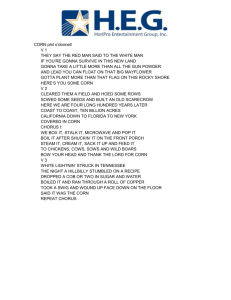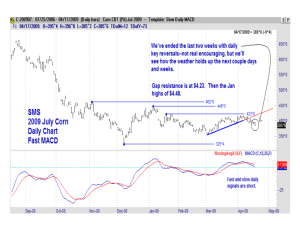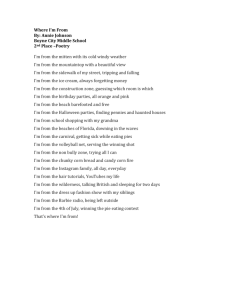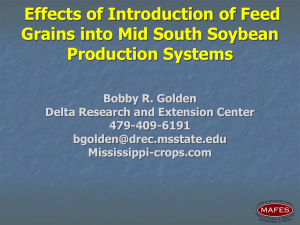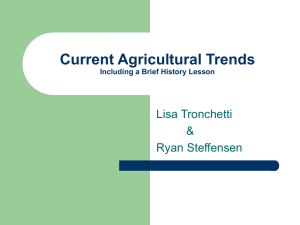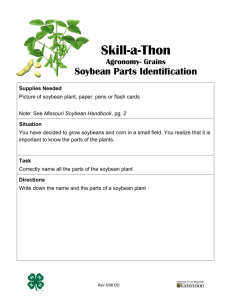AgNews 11-07-05
advertisement
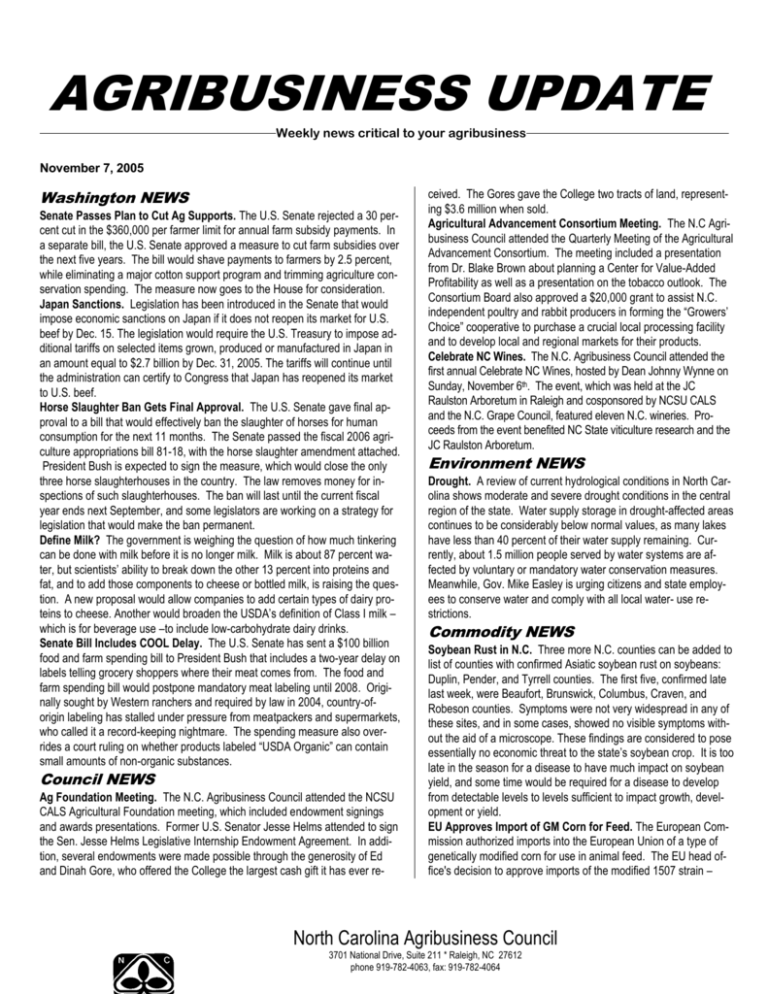
AGRIBUSINESS UPDATE Weekly news critical to your agribusiness November 7, 2005 Washington NEWS Senate Passes Plan to Cut Ag Supports. The U.S. Senate rejected a 30 percent cut in the $360,000 per farmer limit for annual farm subsidy payments. In a separate bill, the U.S. Senate approved a measure to cut farm subsidies over the next five years. The bill would shave payments to farmers by 2.5 percent, while eliminating a major cotton support program and trimming agriculture conservation spending. The measure now goes to the House for consideration. Japan Sanctions. Legislation has been introduced in the Senate that would impose economic sanctions on Japan if it does not reopen its market for U.S. beef by Dec. 15. The legislation would require the U.S. Treasury to impose additional tariffs on selected items grown, produced or manufactured in Japan in an amount equal to $2.7 billion by Dec. 31, 2005. The tariffs will continue until the administration can certify to Congress that Japan has reopened its market to U.S. beef. Horse Slaughter Ban Gets Final Approval. The U.S. Senate gave final approval to a bill that would effectively ban the slaughter of horses for human consumption for the next 11 months. The Senate passed the fiscal 2006 agriculture appropriations bill 81-18, with the horse slaughter amendment attached. President Bush is expected to sign the measure, which would close the only three horse slaughterhouses in the country. The law removes money for inspections of such slaughterhouses. The ban will last until the current fiscal year ends next September, and some legislators are working on a strategy for legislation that would make the ban permanent. Define Milk? The government is weighing the question of how much tinkering can be done with milk before it is no longer milk. Milk is about 87 percent water, but scientists’ ability to break down the other 13 percent into proteins and fat, and to add those components to cheese or bottled milk, is raising the question. A new proposal would allow companies to add certain types of dairy proteins to cheese. Another would broaden the USDA’s definition of Class I milk – which is for beverage use –to include low-carbohydrate dairy drinks. Senate Bill Includes COOL Delay. The U.S. Senate has sent a $100 billion food and farm spending bill to President Bush that includes a two-year delay on labels telling grocery shoppers where their meat comes from. The food and farm spending bill would postpone mandatory meat labeling until 2008. Originally sought by Western ranchers and required by law in 2004, country-oforigin labeling has stalled under pressure from meatpackers and supermarkets, who called it a record-keeping nightmare. The spending measure also overrides a court ruling on whether products labeled “USDA Organic” can contain small amounts of non-organic substances. Council NEWS Ag Foundation Meeting. The N.C. Agribusiness Council attended the NCSU CALS Agricultural Foundation meeting, which included endowment signings and awards presentations. Former U.S. Senator Jesse Helms attended to sign the Sen. Jesse Helms Legislative Internship Endowment Agreement. In addition, several endowments were made possible through the generosity of Ed and Dinah Gore, who offered the College the largest cash gift it has ever re- ceived. The Gores gave the College two tracts of land, representing $3.6 million when sold. Agricultural Advancement Consortium Meeting. The N.C Agribusiness Council attended the Quarterly Meeting of the Agricultural Advancement Consortium. The meeting included a presentation from Dr. Blake Brown about planning a Center for Value-Added Profitability as well as a presentation on the tobacco outlook. The Consortium Board also approved a $20,000 grant to assist N.C. independent poultry and rabbit producers in forming the “Growers’ Choice” cooperative to purchase a crucial local processing facility and to develop local and regional markets for their products. Celebrate NC Wines. The N.C. Agribusiness Council attended the first annual Celebrate NC Wines, hosted by Dean Johnny Wynne on Sunday, November 6th. The event, which was held at the JC Raulston Arboretum in Raleigh and cosponsored by NCSU CALS and the N.C. Grape Council, featured eleven N.C. wineries. Proceeds from the event benefited NC State viticulture research and the JC Raulston Arboretum. Environment NEWS Drought. A review of current hydrological conditions in North Carolina shows moderate and severe drought conditions in the central region of the state. Water supply storage in drought-affected areas continues to be considerably below normal values, as many lakes have less than 40 percent of their water supply remaining. Currently, about 1.5 million people served by water systems are affected by voluntary or mandatory water conservation measures. Meanwhile, Gov. Mike Easley is urging citizens and state employees to conserve water and comply with all local water- use restrictions. Commodity NEWS Soybean Rust in N.C. Three more N.C. counties can be added to list of counties with confirmed Asiatic soybean rust on soybeans: Duplin, Pender, and Tyrrell counties. The first five, confirmed late last week, were Beaufort, Brunswick, Columbus, Craven, and Robeson counties. Symptoms were not very widespread in any of these sites, and in some cases, showed no visible symptoms without the aid of a microscope. These findings are considered to pose essentially no economic threat to the state’s soybean crop. It is too late in the season for a disease to have much impact on soybean yield, and some time would be required for a disease to develop from detectable levels to levels sufficient to impact growth, development or yield. EU Approves Import of GM Corn for Feed. The European Commission authorized imports into the European Union of a type of genetically modified corn for use in animal feed. The EU head office's decision to approve imports of the modified 1507 strain – North Carolina Agribusiness Council 3701 National Drive, Suite 211 * Raleigh, NC 27612 phone 919-782-4063, fax: 919-782-4064 produced by U.S. companies Pioneer Hi-Bred International and Dow Chemical's AgroSciences unit – is valid for 10 years. An authorization for use as food is still under examination. In September, European farm ministers were deadlocked over whether the corn should be allowed into the EU, even though the European Food Safety Authority ruled it safe. Pioneer had requested that the European Commission step in and make a decision. Rising Chemical Costs. Crop chemical manufacturers say prices of some commonly used products could rise 3 percent to 4 percent between now and the beginning of the 2006 crop season. Spokesmen say the companies cannot continue to absorb the costs of rising costs of raw materials. Corn Storage. The 2005 corn harvest has been challenged by finding adequate storage space for all the harvested corn. The combination of a large amount of carry-over 2004 corn in many areas, along with greater than expected 2005 corn yields, and combined with reduced grain exports through the Gulf after the September hurricanes, has filled both on-farm and grain elevator storage to capacity. Many grain elevators have closed their market to taking in and storing corn, other than from producers that are selling the corn on a cash sale to the elevator. Cattle from BSE Animal’s Herd Were Slaughtered. Texas researchers tracking the herd associated with the nation’s first domestic case of BSE found that most of the cattle were slaughtered before federal investigators began their inquiry. The federal government closed its investigation in August, saying it could not pin down how the cow became infected with BSE. USDA and the Food and Drug Administration traced 413 animals and reported that 147 herd mates and offspring of the infected animal were presumed to have been slaughtered for food, livestock feed or other use. However, reports compiled for the Texas Animal Health Commission show that about 350 of the 413 cattle were sent for slaughter. State investigators found that records were no longer available, and ended up using the state’s own cattle health records to get a picture of the herd’s animals. America’s Heartland TV Series. Several commodity groups are supporting a new weekly public television show that is celebrating American agriculture and the farm and ranch families that help make it possible. “America’s Heartland” began airing this fall after being distributed to more than 300 U.S. public television stations. The television series is being produced with the series’ two flagship supporters - the Monsanto Company and the American Farm Bureau Federation. Additional production and promotion assistance is being provided by the National Cotton Council, the American Soybean Association, National Corn Growers Association, United Soybean Board and U.S. Grains Council. Business NEWS Dole Foods in Kannapolis. David Murdock, the California billionaire who owns Dole Foods, will work with the University of North Carolina to build a $1 billion, 350-acre “biopolis” at a former Pillowtex textile mill in downtown Kannapolis. North Carolina Research Campus will include a million square feet of research and lab space, 350,000 square feet of retail/commercial space and 700 residences, including town houses and dorm rooms. It also will be the site of a private science-and-math high school for girls and the home of the Dole Research Institute, UNC Institute for Excellence in Nutrition and the N.C. State University Institute for Advanced Fruit and Vegetable Science. People NEWS Honored. Former CPANC president Lawrence Davenport received the Volunteer Service Award from the National Agricultural Alumni and Development Association. Dr. Johnny Wynne, NCSU Dean commented that Davenport has worked tirelessly to promote prosperity for his home country, the region in which he lives, North Carolina State University and the state of North Carolina. NCDA NEWS Fair Contracts. The Council of State has agreed to allow the Department of Agriculture to begin entering into three-year contracts with carnival ride vendors at the N.C. State and Mountain State fairs. The change still must be approved by the state Rules Review Commission, but Agriculture Commissioner Steve Troxler said he believes the change will create more continuity for the fair. A threeyear contract would give midway vendors more familiarity with state rules and possibly attract more vendors. The change would also be beneficial to the carnival ride companies, allowing them to make up for a poor year with bad weather by averaging their returns. Under the current one-year contract bid process, four different midway operators have run the fair over the past four years. This year's operator, Wade Shows, acknowledged unfamiliarity with state inspection rules when dozens of rides couldn't meet standards by the fair's opening. New Agronomic Testing Fees. The NCDA recently implemented new fees for all agronomic tests except soil nutrient analysis, which is still free. N.C. growers planning for the new season are advised to become familiar with the new fees, some of which vary depending on crop or type of sample. The complete fee schedule is available online at www.ncagr.com/agronomi/feeshtm. Hurricane Relief Fund. Agriculture Commissioner Steve Troxler has announced the creation of the NCDA Hurricane Relief Fund for people who want to help Gulf Coast farmers recover from hurricanes Katrina and Rita. Troxler says that one hundred percent of the money received will go to help farmers and the agricultural community in Alabama, Louisiana, Mississippi and Texas who have lost so much from the devastating effects of these hurricanes. Checks should be sent to: NCDA&CS Hurricane Relief Fund Attn: Pam Moore 1001 Mail Service Center Raleigh, NC 27699-1001 USDA NEWS Soybean Rust Research Funds. The USDA again will fund projects to provide for the early detection, diagnosis, and tracking of the spread of Asian soybean rust in the 2006 growing season. This nationally coordinated network also will help producers in making crop management decisions that reduce pesticide input costs, reduce environmental exposure to pesticides and increase the efficiency and efficacy of pesticide applications. Funds Request for Avian Flu. Agriculture Secretary Mike Johanns announced a request for $91 million in additional resources to safeguard the United States against highly transmissible forms of avian influenza. The request is part of the $7.1 billion National Strategy to Safeguard Against the Danger of Pandemic Influenza outlined by President Bush. Johanns said the USDA is eager to enhance its already extensive efforts to prepare for and prevent an outbreak of a dangerous strain of avian influenza in the United States. The funds would help the USDA intensify its surveillance in the United States and deliver increased assistance to countries impacted by the disease, in hopes of preventing further spread of avian influenza. North Carolina Agribusiness Council 3701 National Drive, Suite 211 * Raleigh, NC 27612 phone 919-782-4063, fax: 919-782-4064
